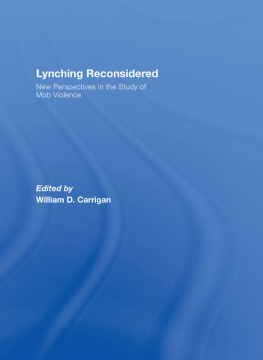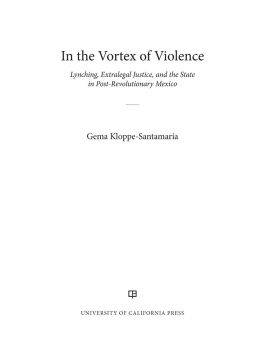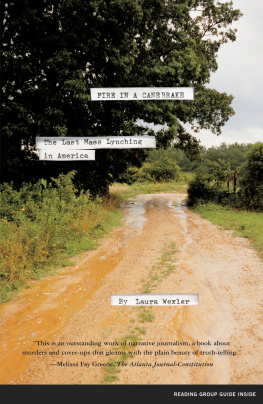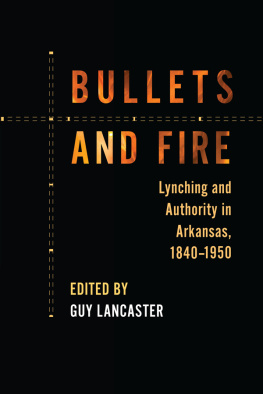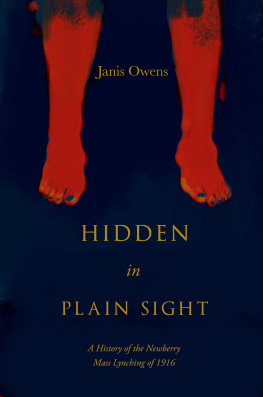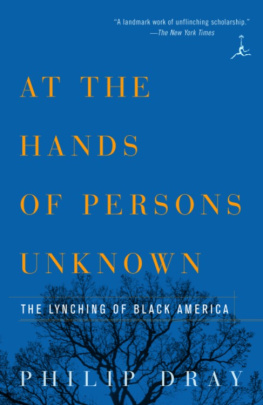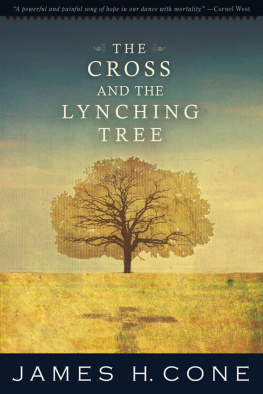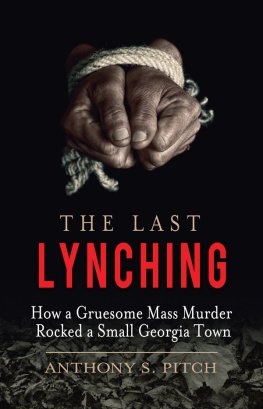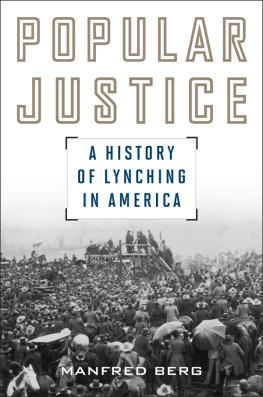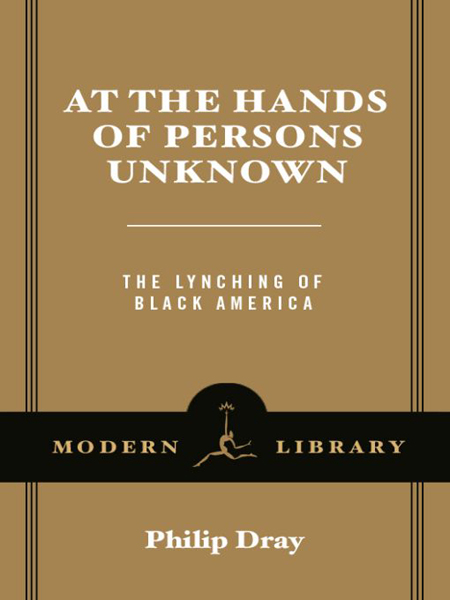
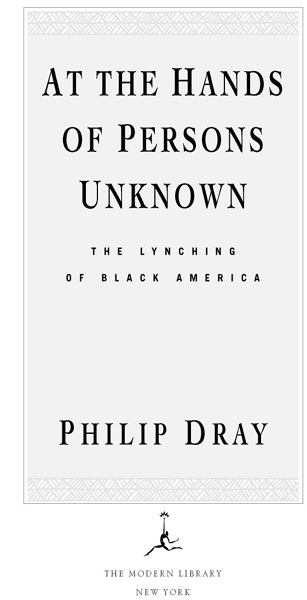
Table of Contents
So quietly they stole upon their prey And dragged him out to death, so without flaw Their black design, that they to whom the law Gave him in keeping, in the broad bright day, Were not aware when he was snatched away; And when the people, with a shrinking awe, The horror of that mangled body saw, By unknown hands! was all that they could say.
So, too, my country, stealeth on apace The soul-blight of a nation. Not with drums Or trumpet blare is that corruption sown, But quietlynow in the open face Of day, now in the darkand when it comes, Stern truth will never write, By hands unknown.
from So Quietly by Leslie Pinckney Hill (1921)
APUBLISHERSWEEKLYBEST BOOK OF THE YEAR
Praise for
At the Hands of Persons Unknown
A full and devastating history of lynching in America... much more than an accounting of the gory details connected with lynching... Dray places murderous vigilante justice (most though not all of it perpetrated by whites against blacks) within a much larger context.
TheNew York Times
Atthe Hands of Persons Unknown is the most comprehensive and thoughtful analysis I know of that most shameful concomitant of slavery and racism in Americathe lynching of thousands of people of color. Philip Drays book is an important contribution to our historical understanding. I hope it will be widely read.
HOWARD ZINN
Philip Drays powerful new book... remind[s] us of the centrality of lynching in American history and of its wide acceptability as well.
ChicagoTribune
Atthe Hands of Persons Unknown is filled with history we need to know.
TheNew York Times Book Review
Riveting... My heart beat faster than normal as I read Philip Drays At the Hands of PersonsUnknown.... For hours at a stretch, I couldnt set it down, perhaps because Dray so skillfully and engagingly filled embarrassing gaps in my knowledge of the brutal practice.
Newsday
Dray has... made excellent use of recent work on the psychology and sociology of lynchings and has incorporated everything into a tight, cleanly written narrative.
TheNew Yorker
This is history most fundamental, the kind that forces us to ponder the very nature of humanity.
Kirkus Reviews
Powerfully disturbing... few historians prior to Dray have chronicled this reign of terror in its entirety: more than 4,000 blacks killed, tens of thousands more terrorized, hundreds of thousands living in fear that their lives could be snatched from them at any moment.
TheWashington Post Book World
Prodigiously researched, tightly written and compelling... vital, hard-hitting cultural history.
PublishersWeekly (starred review)
Enlightening and disturbing... Dray evenhandedly and sometimes shockingly exposes one of the ugliest and most wrenching chapters in American history.
RockyMountain News
Drays work represents a ground-breaking attempt not only to address lynching but also to place it in a larger context. Not only does he deal in great detail with the violent crimes (which include more than hangings), but he also situates them in the center of Southern culture rather than on the periphery.... Drays work is not only a powerful contribution to the literature on American history and culture, but also to our knowledge of the civil rights movements.... Drays work is scholarly and yet accessible to a wide range of readers.
St.Louis Post-Dispatch
Timely, impressively researched and well-written,
TheAtlanta Journal-Constitution
The stories read like a black book of race hatred. To those whose sense of lynching comes from films like To Kill aMockingbird... the killings recounted here are a shock.
TheWall Street Journal
Preface
Its difficult for me to remember exactly what I thought about lynching before the day in 1986 when a librarian at the Tuskegee Institute introduced me to the schools lynching archives. Like most people, I was aware that lynching had been an aberrational form of racial violence in the Deep South, and a means by which cattle rustlers and card cheats had sometimes received rough frontier justice. The Tuskegee collectionits file cabinets, storage boxes, folders, and stacks of magazines and newspapers reaching toward the ceiling, containing records of the thousands of lynchings that had taken place in America over the past centuryspoke of a far less sporadic phenomenon. A holocaust! I heard myself say, as I gazed upon the rooms contents for the first time.
The lynching records at Tuskegee date from 1882, a year after Booker T. Washington established the school in the town of Tuskegee, Alabama. Several generations of Tuskegee librarians and students, guided by the example of Tuskegees first Director of Records, sociologist Monroe Work, have carefully maintained a wide range of newspaper and magazine records of lynchings and other acts of racial violence in America, and until 1962 published a yearly tabulation that came to be considered a definitive tallya kind of Dow Jones ticker of the nations most vicious form of intolerance.
Although Booker T. Washington condemned lynching, for many years he was inclined to downplay it, or to suggest it befell mostly vagrants or lowlifes. The lynching records in Tuskegees library, however, soon took on a life and an importance all their own. Lynch mobs rather pointedly do not keep accounts; in a sense, they seek to negate history itself. The Tuskegee files, silently accumulating during lynchings worst years, ultimately frustrated this resultsimply by keeping track.
In the years 188285, the Tuskegee records show the number of whites lynched in America to have exceeded the number of blacks. After the year 1886, when the school recorded the lynching of 74 blacks and 64 whites, the number of blacks always exceeded whites. In 1892, the archive records 162 black Americans put to death outside the bounds of the law, chiefly in Alabama, Arkansas, Florida, Georgia, Louisiana, Mississippi, South Carolina, Tennessee, Texas, and Kentucky. Through 1944, when lynchings first began to decline strongly, Tuskegee recorded 3,417 lynchings of blacks and 1,291 of whites. Not until 1952 did a year pass without a single recorded lynching.
The term lynching has always been somewhat ambiguous. In the late eighteenth century it referred to nonlethal summary punishment such as flogging or tar-and-feathering. One hundred years later it meant the summary execution by a mob of an individual who had committed an alleged crime or a perceived transgression of social codes. In 1922 it was defined (in one version of proposed federal antilynching legislation) as five or more persons acting in concert for the purpose of depriving any person of his life without authority of law (in a final version the number of conspirators was changed to three). Twelve years later, a bill before Congress described a lynching as a mob or riotous assemblage composed of three or more persons acting in concert, without authority of law, to kill or injure any person in the custody of any peace officer, with the purpose or consequence of depriving such person of due process of law or the equal protection of the laws. A federal criminal statute dating from Reconstruction that came to be used against lynch mobs in the mid-twentieth century cited two as the number required to constitute a conspiracy. Today, when lynchings are virtually nonexistent, the term is used primarily as a metaphor, the most well-known example being that of Supreme Court Justice Clarence Thomas who, in his televised confirmation hearing before the Senate Judiciary Committee in 1991, complained that he was the victim of a high-tech lynching.
Next page

